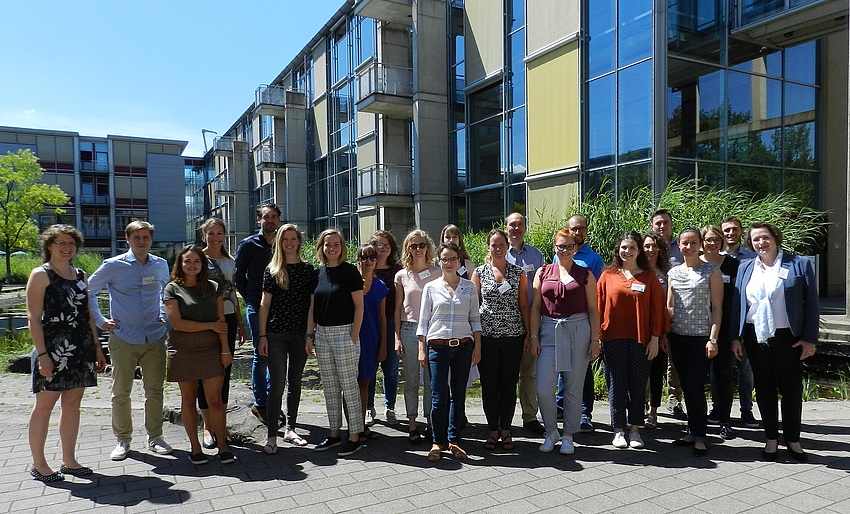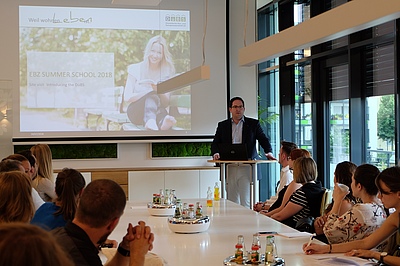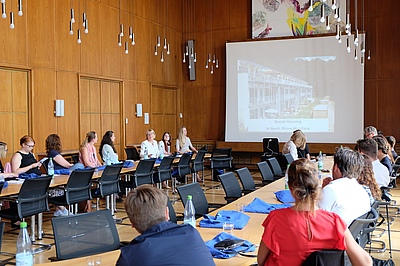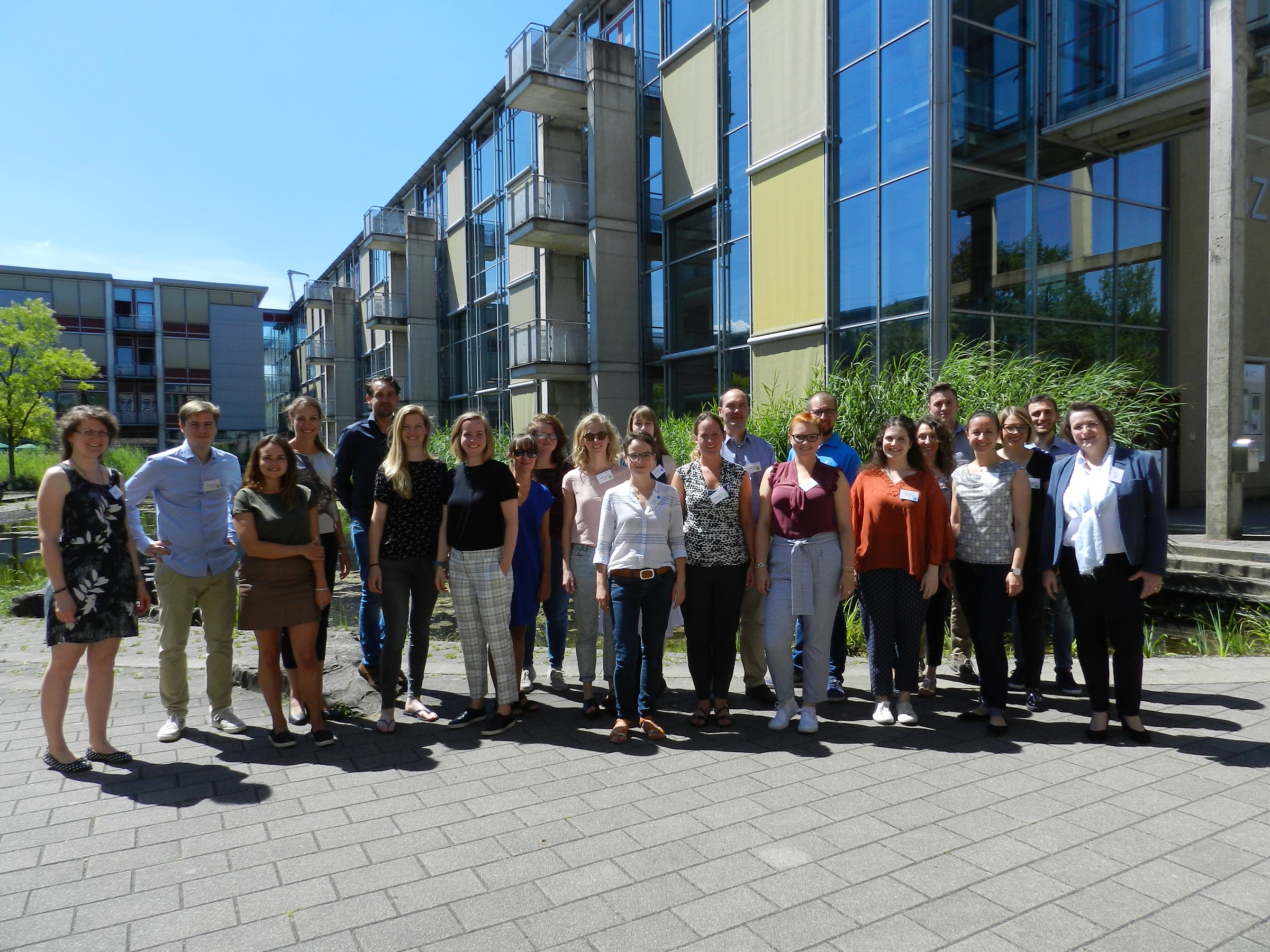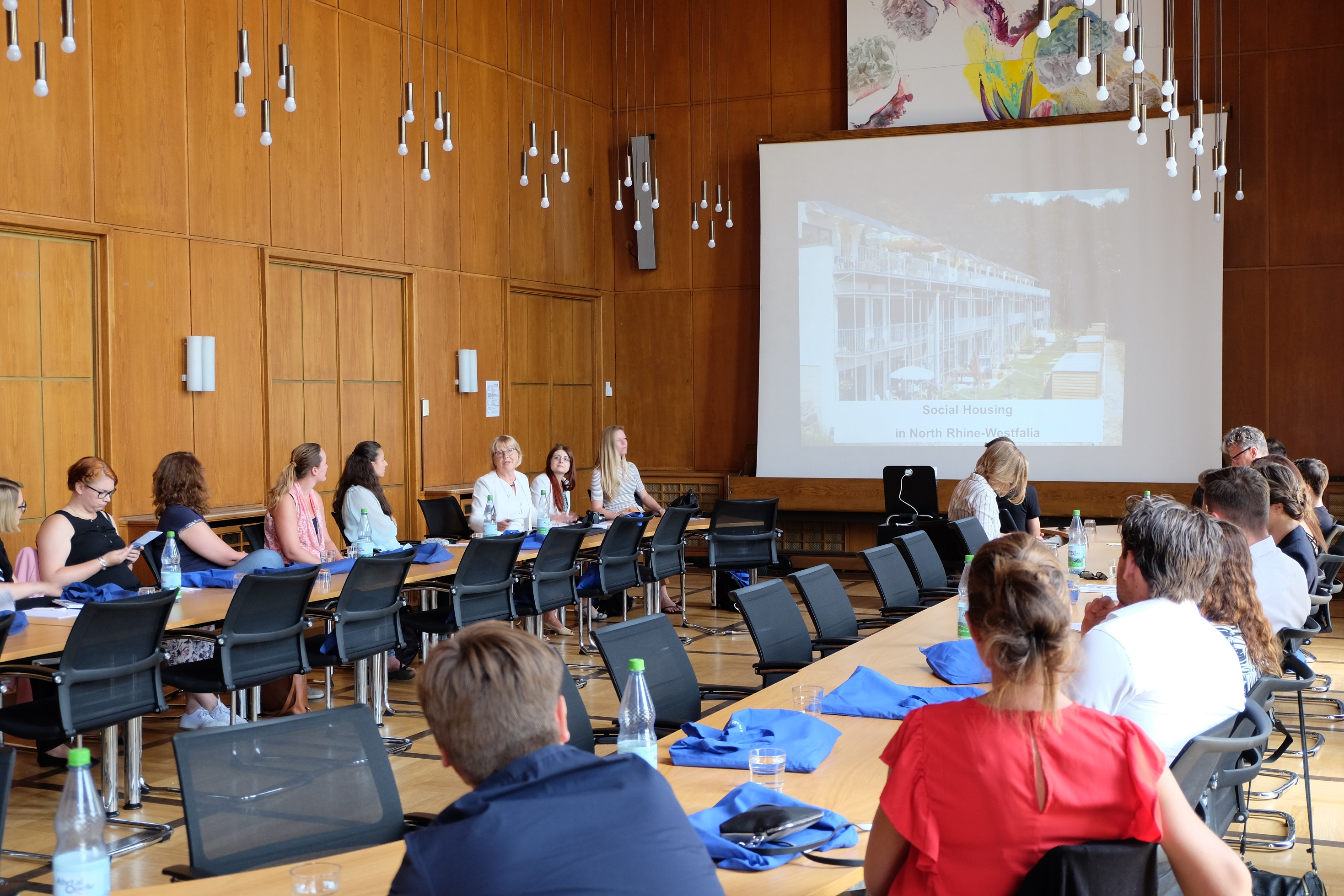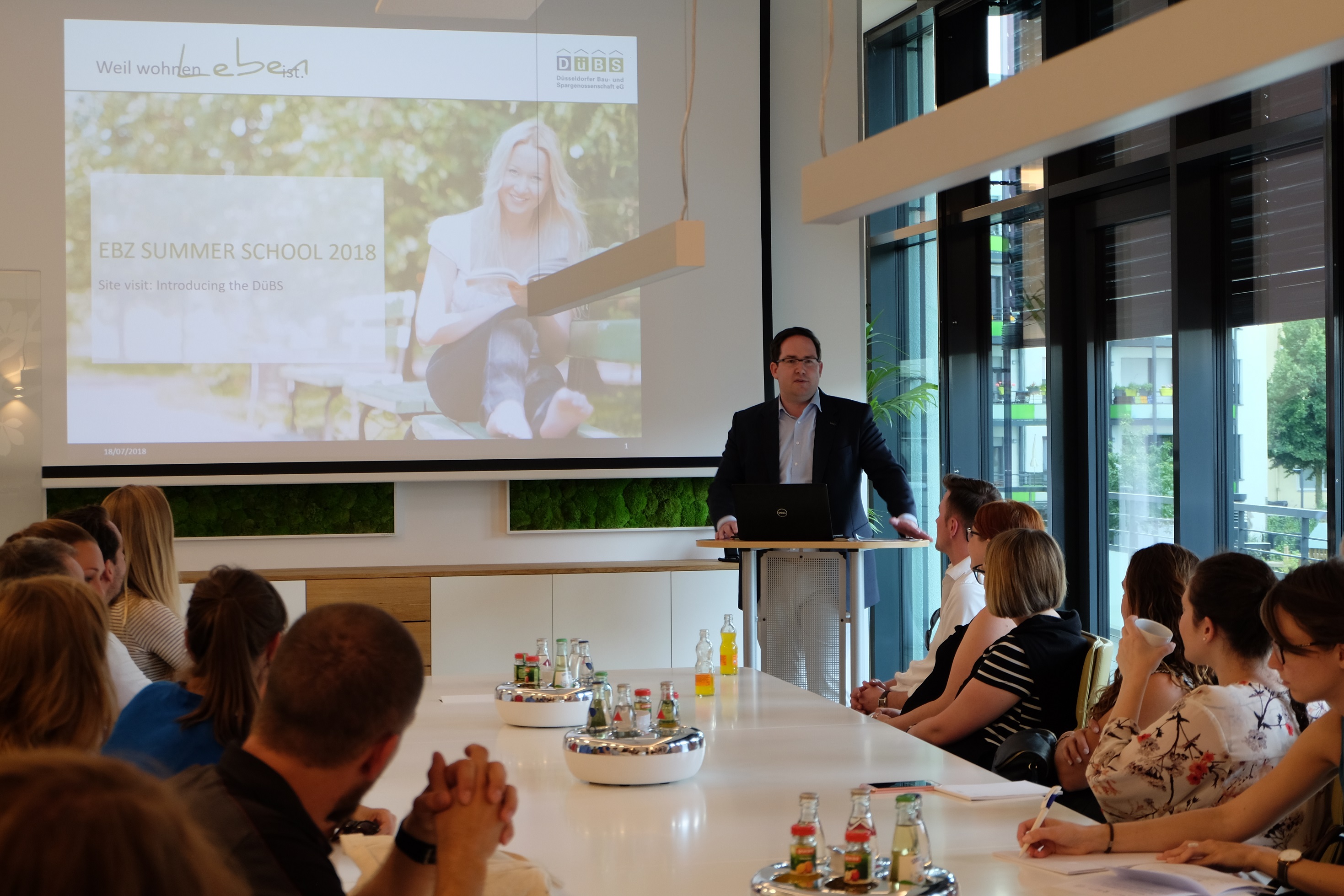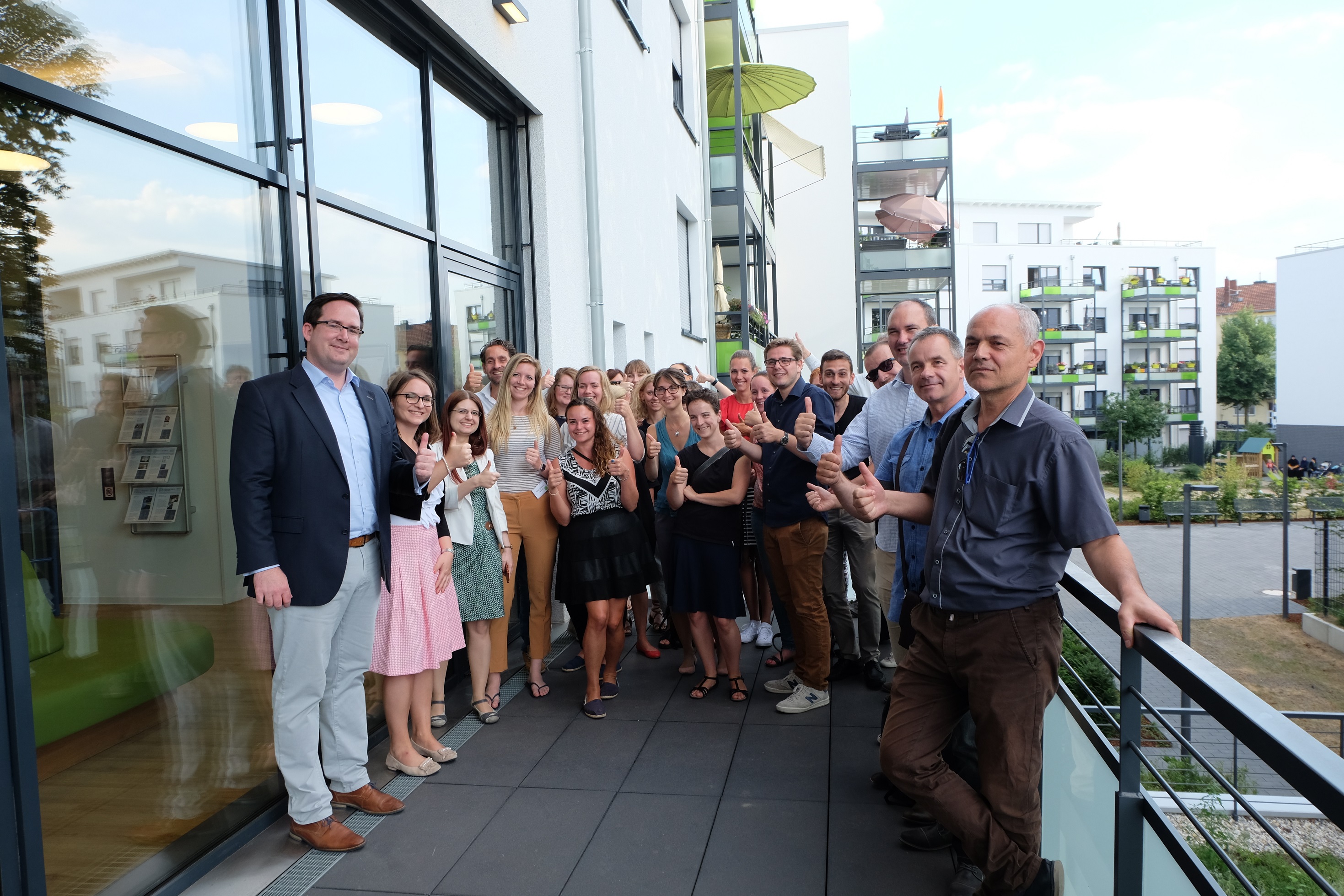New Challenges for Affordable Housing in Europe - Summer School for Young Professionals
16 - 20 July 2018, Bochum (Germany)
Affordable housing in Europe: How do the various member-states do it?
Key messages from the second edition of the European Summer School
How can affordable housing be financed? This is just one of many questions discussed among housing providers across Europe. Each country works on its own on solutions and develops new tools. At the second edition of the European Summer School at the EBZ in Bochum around 25 young professionals working for public, cooperative and social housing providers in 6 EU countries had the chance to exchange similarities, differences and courses of action.
By Susanne Juranek, translated into English by Michalis Goudis
The affordable housing sector works differently in the various EU member-states, since there is no common EU definition of ‘social housing’. In Germany, there is a clear regulatory framework for social housing, though its share is more and more declining. With only 3,9% of the housing market, the country is ranked 15th in Europe. The Netherlands is on the top of the list with 30% of the overall stock being social, followed by Austria (24%) and Denmark (20%). But there are also countries where social housing is less established with homeownership having a much stronger tradition as for instance is the case of Spain and many eastern European countries.
While the provision of affordable housing is a big challenge across the continent, there are concrete differences when it comes to funding related to the national context and regulatory framework. This was one of the clear outcomes of the exchange between around 25 participants of the summer school from the Netherlands, Germany, Belgium, France, Ireland and Italy.
Delegates were able to get a closer look at the national financing mechanisms and to evaluate the respective tools. Italy was considered to be a positive example, in particular a model based on a private, non-profit foundation that promotes social housing with the support of an ethical real estate fund and public-private partnerships. The so-called “Performance bonds” in the UK also received positive feedback, since the level of interest rates is calculated taking into consideration whether the company has achieved its strategic goals. Moreover, housing allowances for low-income households, e.g. like in Germany were termed best practice.
On the other hand, participants had a rather critical look at rent control for social housing in Germany, as it is only temporary. Similar was the reaction towards the ‘Usufruct’ models in France, as in this case the land is used at a reduced price to host social housing for a period of 15 to 20 years but then can be used without limitations by investors. Both models were deemed not sustainable.
Besides lectures from experienced experts, and interactive workshops, the participants visited the Ministry for Regional Identity, Communities and Local Government, Building and Gender Equality of the Land of North-Rhine Westphalia, where Rita Tölle, the Director of the Department 407 for the Funding of Housing Rehabilitation, presented the funding programmes of North-Rhine Westphalia for social housing. Moreover, the young professionals were introduced to the German cooperative model through the example of the Construction and Savings Cooperative in Düsseldorf (Düsseldorfer Bau- und Spargenossenschaft eG). The group paid a visit to the newly constructed ‘Kastanienhöfe’ (‘chestnut courtyard‘) project that also includes social housing as well as homes at a reduced price despite the tight housing market in the city.
Cities and in general the urban dimension were moreover among the focus points of the European Summer School. Co-governance, Co-design, Co-creation and ultimately Co-City have been at the core of the debate about designing living environments and neighbourhoods in a participatory way. The ‘Starters Up’ project of the Dutch Housing Company Eigen Haard was identified as best practice in Amsterdam where more and more young people arrive pursuing a job opportunity while looking for an affordable place to live. The project aims to build a strong community, including homeless people, as well. Tenants have to organise themselves, use and maintain community rooms, gardens and shared spaces. Dwellings are rather small, more like studios, to keep prices low and to promote the use of the generous communal facilities.
Food for thought from the academic research front was on the menu as well as practical examples that added to the exchange of experiences that participants are supposed to share back in the office with the rest of their team.
The European Summer School was hosted by EBZ Business School, co-organised with Housing Europe, EFL – European Federation for Living, and IWO – Housing Initiative for Eastern Europe. This year’s event was supported by EFL Expertise B.V. The next edition will take place in summer 2019 again in Bochum.
Download the Programme
Mieke van den Berg, Director, Eigen Haard, The Netherlands
Prof.dr. Peter Boelhouwer, Professor of Housing systems, TU Delft, Chairman of the European Network for Housing Research, The Netherlands
Prof.dr.ir. Vincent Gruis, Professor of Housing Management, TU Delft, The Netherlands
Christian Iaione, Professor of Urban Law and Policy, Co-director of LabGov.City, Italy
Fabien Lasserre, Head of R&D and Engineering Department, Vilogia, France
Anna Müller, Neighbourhood Manager, Gewobag MB Mieterberatungsgesellschaft mbH, Germany
Paul Rickard, Chief Financial Officer, One Housing, UK
Alvis Stražinskis, Head of IT and Analysis Department, Latvia
| For Participants | For Companies/Housing Providers |
|---|---|
|
|
|
|
|
|
|
|
Who should register?
Young professionals (in general less than 10 years of working experience) from the housing sector
Are there any admission requirements?
A working knowledge of English is required to follow presentations and participate in the programme
What are the participation fees?
1,500 EUR per person; if employed by a company that is a member of EFL European Federation for Living, a reduced fee of 1,300 EUR applies
What is included in this price?
Participation in all programme activities, accommodation at EBZ hotel facilities on campus (2-bed rooms for single use, four nights), full board (as indicated in the programme), certificate of participation at the end of the course
How can I register?
The registration is open until June 22, 2018. Please register here.
Where is EBZ located and how do I get there?
Address: EBZ, Springorumallee 20, 44795 Bochum
The closest airport is Düsseldorf Airport (DUS), which is connected to Bochum by regional train. Other airports in the vicinity are in Dortmund or Cologne. Bochum is well connected to the German railway and motorway network and can be easily reached by train or car. From Bochum Central Station, the buses 354, 394 and 388 will take you to EBZ.

Valentina Zaro, Fondazione Housing Sociale, Italy
"The Summer School has been a great experience to me, it gives you the chance to confront yourself and your work with international people that are dealing with the same sort of problems. The fact that the participants are only young practitioner facilitates the creation of an easy atmosphere where you don’t give for granted some notions. Finally, the organization was great and everyone was really friendly: in the morning there are interesting lectures and in the afternoon you can challenge yourself in workshops held by very passionate mentors. I liked to have the chance to participate at an organized field trip to Düsseldorf because we could directly see a best practice. Every evening, there were beautiful dinners and activities but there was also space for personal time."
Sarah Herssens, SLRB - Société du Logement de la Région de Bruxelles-Capitale, Belgium

